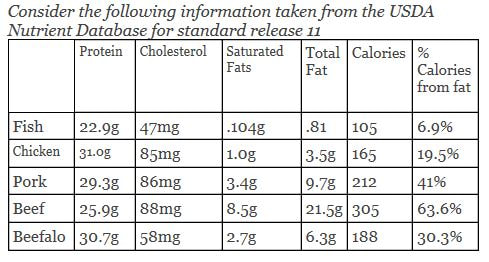
Pasture fed or organic?
It’s important to remember that organic is not the same as pasture fed. Natural food stores often sell organic beef and dairy products that are hormone- and antibiotic- free. These products come from animals who were fed organically grown grain and/or possibly organic silage, but who typically still spent most of their lives in feedlots/Confined Animal Operations.
Pasture fed meat is:
*Healthy for people – Research shows that pasture fed meat is lean, contains a high percentage of good fats-Omega 3s and CLCA– and beneficial antioxidant vitamins and minerals.
*Healthy for animals - Cattle, goats, sheep, and bison evolved to eat grass and not much else. Feeding them a diet rich in grains creates an acidic environment in their digestive systems, leading to disease and the need for treatment with antibiotics.
*Healthy for the planet - Pasture-based farming restores natural ecosystems and wildlife habitat, reduces reliance on petrochemicals, improves the soil with organic matter, and reduces greenhouse gasses, especially CO2
*Healthy for communities - Small family farms provide jobs and strong economies in rural communities and create sustainable businesses for succeeding generations.
Why Beefalo?
An estimated 30-60 million bison roamed the plains of our beloved United States of America in 1800. With bodies perfectly adapted to the environment, herds as far as the eye could see flourished with absolutely no human care or intervention. Natural selection had created a bovine perfectly tailored to the North American climate, naturally possessing disease resistance, pest control, intensely efficient foraging, climate hardiness, high fertility, and calving ability.
Today, forward-thinking producers and distinctive consumers alike, have the opportunity to have the image of health in both their fields and on the plate. The benefits don’t stop in the pasture, however. As one of the best-kept secrets in the health food market, Beefalo has been shown by USDA testing to possess superior vitamin levels, higher protein, nearly 1/3 less cholesterol, 79% less fat, and 66% less calories than conventional beef. Don’t let the health benefits fool you; Beefalo cuts, judged by overall flavor and texture, have received the “Best Steak” award multiple years running at the American Royal Steak Competition. Cutting edge restauranteurs and health leaders are discovering the vast benefits of bringing beefalo to their tables.
A common misconception about Beefalo is that it is half cow, half buffalo. Though the original producers did have to cross the two "Bovinae," what we call Beefalo today is an advanced mix of Domesticated Cattle and 37.5% American Bison. This cross was chosen specifically as it has been show as the 'sweet spot' of the genetic pool, allowing all the best qualities of both animals to be present. Registered Beefalo Herds are a consistent 3/8 bison, 5/8 domestic bovine heritage. Any animals containing more bison DNA are therefor considered Cattalo and do not possess the same qualities or appearance of the USDA recognized breed of Beefalo.
As a small family farm, our beefalo have several traits that really make them a great breed for us. One of our favorite traits is that the calves are born very tiny (as are bison calves in nature) and this almost always ensures we do not have to pull any babies. Which means higher success rate for mom & baby and less likely that one of us will get hurt while trying to help mom deliver. In the last 6 years, we have only had to pull 2 babies and that was because the mommas were first calf heifers. Those rates are almost unheard of in other cattle breeds! They are also very efficient foragers for the type of high mountain grass we have and because of the bison influence, they finish very, very welll on grass only. Many other breeds have been designed over the last 50 years to flourish in feedlots, not on the range, and therefore, they do not finish well & marble up on grass, they tend to need a grain diet to properly finish. Whereas, Beefalo get a great finish on JUST GRASS!
